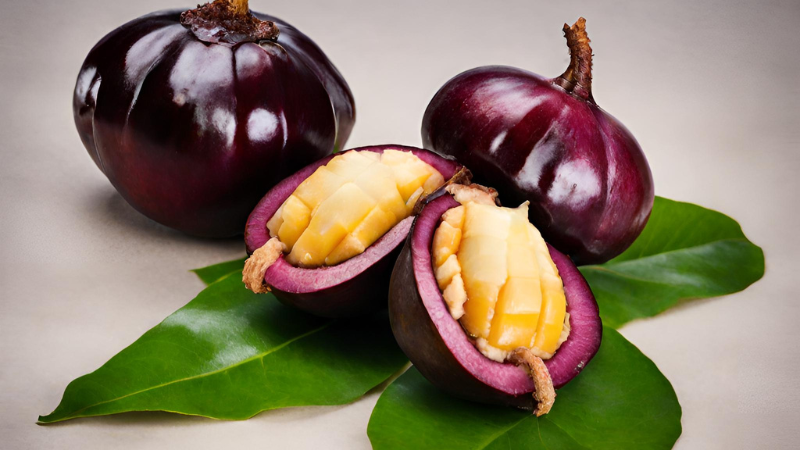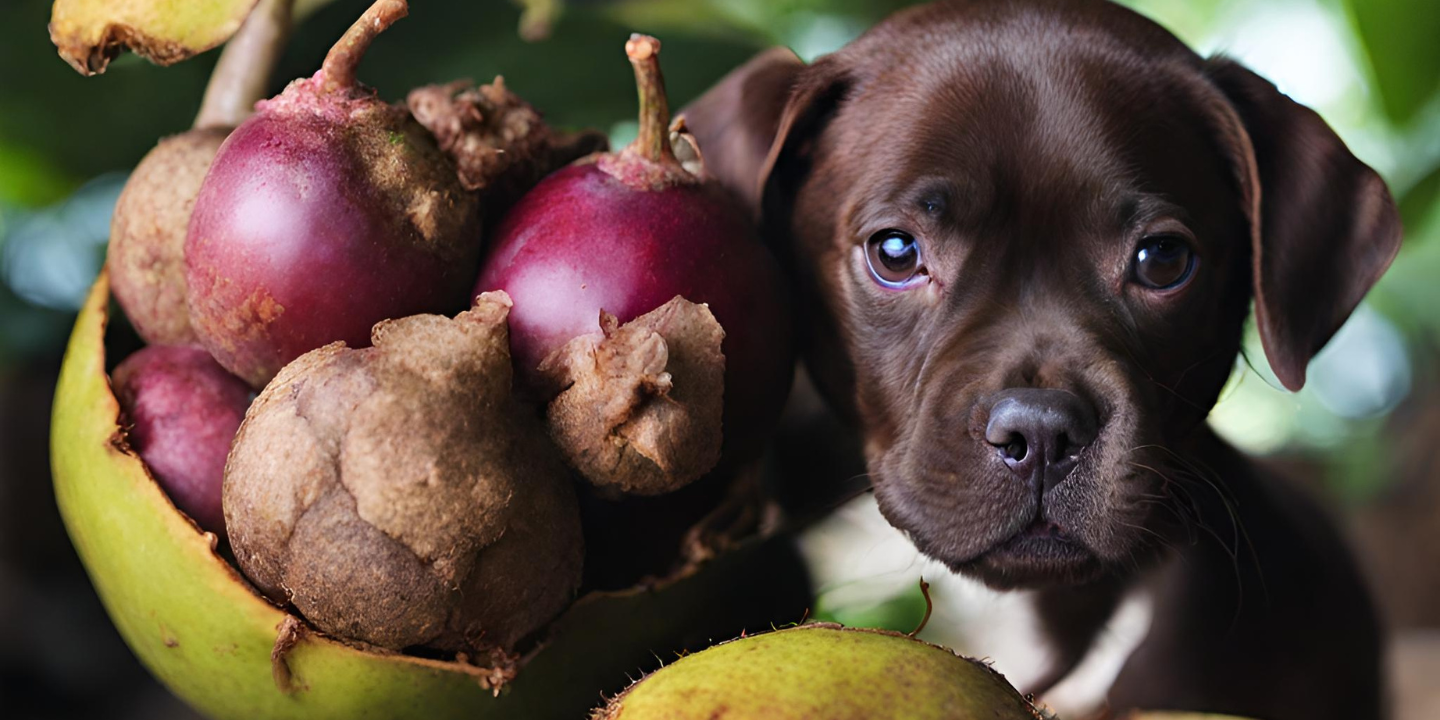The vibrant and flavorful mangosteen is often celebrated for its health benefits in humans, but what about our canine companions? Can dogs indulge in this tropical fruit, or should it be completely off-limits? In this article, we’ll unravel the mystery of whether dogs can eat mangosteen and examine the potential benefits and risks for their overall health and well-being.
What is Mangosteen?
Ever wonder about that intriguing purple fruit at your local market? That’s mangosteen for you. Mangosteen is not just a pretty face; it’s packed with nutrients like vitamin C, fiber, and unique antioxidants known as xanthones. It’s often called the “queen of fruits” for its rich, almost indulgent, taste and its crown-like stem. As people enjoy its benefits, one can’t help but ponder if our four-legged friends can savor mangosteen too.
Nutritional Content and Natural Properties
When we peek inside the thick purple rind of the mangosteen, we find a soft, white fruit that’s both delicious and packed with nutrients. Mangosteens are rich in vitamin C, fiber, and various antioxidants, which are all important for a healthy body. They also contain minerals like potassium and magnesium, which keep our bodily functions running smoothly.
On top of that, mangosteens come with a special antioxidant known as xanthones. These give the fruit its superpowers, like fighting inflammation and supporting the immune system. All in all, mangosteens are nutritional powerhouses for humans, but it’s not clear if our four-legged friends can safely enjoy these benefits too.
Positives of Dogs Eating Mangosteen
Treats for treats! That’s what your dog might be thinking when they spot you munching on something delicious. But when it comes to sharing exotic fruits like the mangosteen, there’s good news! This section is dedicated to digging into the benefits that this juicy tropical delight could potentially offer to your tail-wagging pal. Let’s fetch those facts and find out the upsides of adding a little mangosteen magic to your pup’s diet.
Potential Health Benefits
Mangosteens aren’t just delicious, they’re packed with nutrients that could be good for your pup! This exotic fruit contains vitamins like Vitamin C, which is known for keeping the immune system strong. It also has a bunch of minerals like magnesium, potassium, and zinc, all big players in maintaining your dog’s overall health.
But the real star of the show in mangosteens is a compound called xanthones. These supercharged antioxidants can help in the fight against inflammation and may even support heart health. It’s like a tiny shield for your furry friend’s body, protecting them from various health issues! Keep in mind though, before adding anything new to your dog’s diet, a chat with the vet is always the way to go.

Effective Antioxidants
Antioxidants play a crucial role in maintaining health, not just for humans but for our tail-wagging pals as well. These substances work like tiny superheroes, fighting off the damage caused by free radicals in the body. Free radicals are naughty little molecules that can lead to cell damage, and antioxidants are the guardians that neutralize them.
Mangosteen is chock-full of these valiant fighters, especially a group known as xanthones. These xanthones are powerful antioxidants and they have some pretty impressive health claims attached to them, such as anti-inflammatory and anti-cancer properties. For our four-legged friends, this means eating mangosteen might help in keeping their cells healthy and their bodies running smoothly. But remember, moderation is key, and it’s always best to check with a vet first.
Supporting Canine Immunity
Fido’s immune system is his inner superhero, fighting off the nasty bugs that try to make him sick. So, it’s super important to keep this superhero strong. Just like us, dogs can get a helping hand from certain foods, and that’s where mangosteen might come into play. This tropical fruit is not just a pretty purple package; it’s teeming with vitamins and minerals that could help bolster your pup’s defense against illnesses.
Packed with vitamin C and a host of other nutrients, mangosteen could be a sidekick in supporting your dog’s immunity. However, it’s not a magical cure-all and should only be a tiny part of a well-rounded diet. Always remember, before you let your pup chow down on exotic snacks, have a chat with your vet. They’ve got the know-how to make sure your four-legged friend’s immune system can keep on saving the day, without any fruit-induced mishaps.
Negatives of Dogs Eating Mangosteen
Just like all coins have two sides, the mangosteen is no exception when it comes to our four-legged pals. While it might be tempting to share this juicy treat with your dog, it’s important to paw-se and consider some of the downsides. Let’s take a closer peek at what could potentially put a damper on this tropical delight for your canine friend.
Potential Dangers and Risks
When it comes to sharing your favorite fruits with your pupper, caution is always the best policy. Sure, mangosteen is loaded with nutrients for humans, but it isn’t as clearly beneficial for our pooch pals. One of the first red flags is the fruit’s sugar content. Dogs have a more sensitive digestive system, and too much sugar can lead to obesity or dental problems over time.
But the sugar is just the tip of the iceberg. There are other components in mangosteen that might not sit well with our four-legged friends. Dogs have a completely different metabolism, and substances that are harmless to us can be harmful, or even toxic, to them. It’s crucial to be aware that the rind of the mangosteen contains compounds that can be especially problematic. This part of the fruit is a definite no-go zone for dogs, as it could lead to serious digestive issues or worse. Always keep an eye out for your dog’s reaction to new foods and consider any allergies they might have.
Digestive Issues and Allergies
When it comes to your pup and exotic fruits like mangosteen, it’s not just about the taste, it’s about their tummy’s reaction too. You see, dogs have a different digestive system than we do, and tossing a new food into the mix can sometimes lead to an upset stomach. This might show up as diarrhea or vomiting, which isn’t fun for anyone involved. So, caution is key when giving your dog something new.
Aside from the potential stomach upset, allergies are another concern. Just like people, dogs can be allergic to pretty much anything, and mangosteen could be on that list. An allergic reaction might include itching, swelling, or difficulty breathing. If you notice anything out of the ordinary after your dog eats mangosteen, it’s time for a vet visit. Always keep an eye out for any quirky reactions when your dog tries a new treat.
Toxic Components for Dogs
When it comes to mangosteen and pups, it’s not all about the juicy goodness. This fruit has a dark side, specifically a few components that can be harmful to our four-legged pals. One such element is the natural chemical compound xanthones, found in the fruit’s rind. Sure, xanthones are celebrated for their health benefits in humans, but their impact on dogs isn’t as peachy.
Apart from that, the high fiber content in the skin can cause gastrointestinal upset in dogs. It’s a classic case of too much of a good thing turning bad. Always remember that dogs have a different digestive system than humans, so what’s beneficial for us can sometimes lead to a tail-wagging no-no for them. So, it’s important to peel that mangosteen and keep a close eye on your furry friend if you decide to share this tropical treat.
Conclusion
In conclusion, while mangosteen may offer certain health benefits for humans, its effects on our furry friends are not as straightforward. As with all new foods, it’s essential to consult a veterinarian before introducing mangosteen into your dog’s diet. Understanding both the potential benefits and risks will help pet owners make informed decisions when it comes to their dog’s nutrition and well-being.








